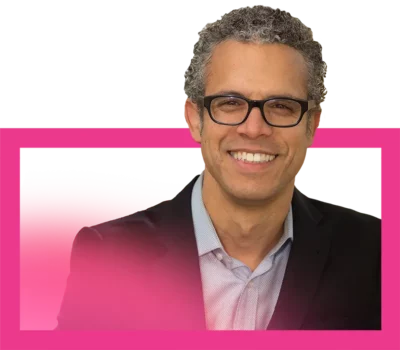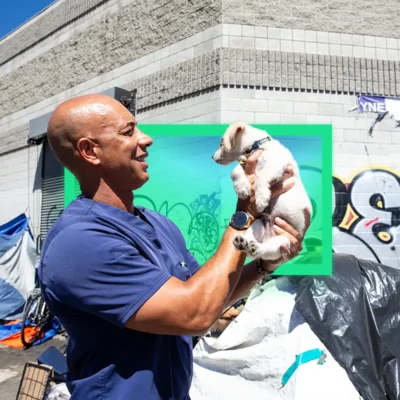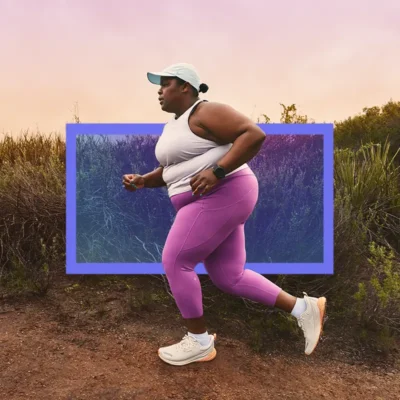Getting unstuck, reframing the question
Omar Wasow had a fabulous life as a reporter and tech expert – he even taught Oprah how to use email! But an important piece of unfinished business from his college days kept nagging at him, and even tempted him to run away from his life and hide. Why did this one-time gifted kid struggle to complete something that mattered to him? Why couldn’t he even get started? In another classroom, in the face of a small girl struggling with her own “impossible” task, he realizes the answer – and reframes the question.


Table of Contents:
Transcript:
Getting unstuck, reframing the question
OMAR WASOW: In public, my life looks enviable. In private, I feel unmoored. One day I’m driving through Utah. I help organize a ski trip with friends every Martin Luther King Jr. weekend.
I drop a group of people at the airport and start driving back to our rented cabin. Snow-capped mountains loom on either side of me. The sky above the road darkens. A thought occurs to me as I navigate the curves. What if I keep going?
Just keep driving down the open roads … travel through the vast expanse of the mountain west. What if I just escape from my life? What if I flee?
I keep driving. The night cloaks the mountains in darkness.
ROHAN GUNATILLAKE: Omar Wasow teaches politics at Princeton. As co-founder of the Black Planet platform, Omar has been a real pioneer of early social networking well before Facebook came along. In today’s Meditative Story, Omar’s many achievements cloak a troubling secret: quietly, out of sight from those around him, he, like so many of us, struggles to see the brightness others see in him. We are grateful to Omar for sharing his Meditative Story for its universal theme that so many of us can relate to.
In this series, we combine immersive first-person stories and breathtaking music with the science-backed benefits of mindfulness practice. From WaitWhat, this is Meditative Story. I’m Rohan, and I’ll be your guide.
The body relaxed. The body breathing. Your senses open. Your mind open. Meeting the world.
WASOW: It’s 1992, and I’m sitting in an open air arena with hundreds of my fellow Stanford students. In my heavy black graduation robe, sweat trickles down my back as I squint into the heat of the midday sun. Just outside the stadium I can picture the palm trees, the sandstone buildings where I took classes, the foothills in the distance. I’ve been waiting for this day for so long – we all have. I try to take in the magnitude of the moment. I visualize the thick black leather diploma binder that I received yesterday from my department, sitting on my desk in my dorm room.
The applause thunders. The arena feels like it’s exploding. It all looks like a graduation is supposed to look.
My little secret is safe.
I’m running up the arena steps, dodging families, friends, and partners hugging their graduates. Camera shutters click in every direction.
I finally reach my own family. My Mom, Dad, Aunt and Uncle stand in front of me. They smile as they spread their arms, each waiting to hug me, to mark this milestone.
As we look for someone to snap a group picture, a melancholy thought suddenly flickers: Will the camera capture what I’m actually feeling behind my smiles and laughter?
I steal a glance at my parents. We all know the truth.
The thick black leather binder holding my diploma … is empty.
I’m not actually graduating today. Or next semester. In fact it will take me a dozen years to earn the piece of paper this leather binder is supposed to contain. Twelve years to realize I’ve been telling myself the wrong story.
As the camera snaps a picture, I stare back at that shutter with a grin wide enough to mask the truth.
It’s the dead of night, and I’m the only one awake. The colors of Greenwich Village flicker on and off outside my bedroom window. Though I’m on the fourteenth floor, voices carry from the street, and I can hear people laughing and carousing. I see bright yellow taxis slowing down on the wide street, hoping to pick up revelers as they head home from a night out.
My night is not so merry. I’m 17 years old, at my desk and panicking in the blue light of my blocky old Mac. In less than 10 hours my AP American History essay is due. I’ve written a paragraph. How did I end up here again?
It’s not that I don’t love the class – it’s my favorite. I love the teacher, too. His passion is so genuine, it’s hard not to get swept up. I’m also from a family that honors teaching. My father’s a professor of economics. His father, a mathematician. My mother’s an early childhood educator. There’s a school in Texas named after her great aunt. A Black woman who was a leading educator under segregation. In my family, school and education are a calling. It’s in our blood.
I’m a decent student, in a competitive school where the structure of the academic program pushes you to strive. I get good grades. I participate in everything. I become student body president. My circumstances are not universal, but the challenges I face often are.
Something’s off, and it comes out as this insane procrastination problem. I’m constantly running down to the wire. I have a story in my head about how papers get written that goes something like this: I have a talent for writing but I can’t start until that lightbulb sparks above my head. I need inspiration. So, I wait for the clouds to part, for lightning to strike. Often that process works, but not always.
It doesn’t come tonight, but I manage to squeak something out in time.
Everyone procrastinates now and then – that’s normal, I know. But this goes deeper.
GUNATILLAKE: I like the way Omar describes what inspiration is for him. But it’s not a passive thing, we have to be ready to receive it. Open, alive, alert, but relaxed. Let’s take a couple of breaths to be that ourselves. Now take another, and on the release as the breath goes out, invite inspiration to flow in.
WASOW: The sound of my forehead hitting the keyboard breaks the silence of the empty computer lab. My fingers twitch from hours of typing. I close my eyes but still see code. It’s my first year at Stanford, and it’s happening again.
It’s my third late night in a row this week. I need to get out of here. I print the code, drag myself to my dorm, and knock on my neighbor Astro’s door. He’s the best kind of geek. He’s the grandson of a Nobel Laureate, but what he’s famous for is whizzing around campus on rollerblades, a streak of color shooting through the coast live oaks. He makes everything look easy.
I thought it was supposed to be easy for me, too, that’s also a part of the story in my head. My whole life in subtle ways I’ve gotten clues I’m a smart kid. In middle school, I test into more advanced classes. In high school people come to me for help with their code. Now though, I’m banging on a classmate’s door late at night, in need of help.
I hear Astro’s footsteps and then he opens the door. Sheepishly I hand over my printed code.
I came to college with such confidence. But a good wine, without a bottle, is just a puddle. And that’s how I start to see myself.
One day between classes, a couple friends and I stop at the campus post office, a low building with a terracotta roof. Rows of identical metal boxes. Mine’s usually empty, but I open it anyway – and spot a letter in the back. It’s a letter from my dean’s office. I turn from my friends. My heart starts to pound, gently at first, then harder as I tear open the envelope.
I’ve been put on academic probation. What?
The post office lights seem to flare as my stomach flips. Probation?
I’ve never been a student that struggled. Well, at least, not on the surface. I always just made the deadline, or studied just enough for the test. And that was always just enough to do well, to make my parents happy, to impress my teachers. I look a little deeper though, I was struggling. I didn’t have the tools I needed. I didn’t really know how to study or write without a feeling of terror in the face of a deadline. I lurch from crisis to crisis.
I shove the letter back into the bottom of my bag before anyone can see.
In the months ahead, I do what I can to get back on track. My grades recover somewhat, but I still feel lost, like I’m being asked to play a game in which I don’t understand the rules. I feel alone. What do other students understand that I don’t?
How to cope? I distract myself! I start a literary journal called Enigma, focusing on Black arts and culture. I connect a local radio station, KZSU, to our campus coffee house. Together, we organize hip hop nights for the whole student body.
I’m really proud of the work I’m doing, But it’s not the work I should be doing.
One day, junior year, with the burden of another deadline looming, an advisor at my dorm takes me aside. She sees the stress beneath my smiles, and mentions Stanford’s policies of incompletes. If a professor gives the okay, I can request an extension at the end of the semester and simply turn in the final paper at a later date. I get my first incomplete approved and instantly I feel like a huge weight has been lifted.
The pressures I put on myself, my family’s expectations – it all floats away, at least for the moment. I feel light. I feel elated. The “incomplete” policy is like a magic escape button. But it also turns out to be a trap.
By the time I get to my last semester, I have six incompletes. It turns out my problem isn’t really needing more time, it’s not knowing what to do with the time I have. In my head, writing demands inspiration. But how do I make lightning strike on demand? I don’t know. And more time doesn’t reveal the secret.
And now it’s all caught up with me. That day in the open-air arena in the sea of black gowns, I’m sitting with students who are the first in their families to graduate from college. And I’m the opposite. I’m incredibly lucky. I’m privileged. I’m from a family where on both sides, for multiple generations, people have college degrees.
I leave Stanford with no BA. Hands clenched around that empty leather binder, I am my family’s first non-graduate.
My life post-Stanford is, by all measures, a good life. I work for a non-profit, teaching entrepreneurship. I start what becomes the largest African American social network, Black Planet. I even get on TV, teaching Oprah how to use email.
There’s a lot to be happy about. But I can never completely take my mind off my empty diploma binder.
And that hangs over my life like a cloud. I begin studying that cloud. If I’m actually talented, why aren’t the papers getting written? What’s wrong with the story I’m telling myself?
In public, my life looks enviable. In private, I feel unmoored. One day I’m driving through Utah. I help organize a ski trip with friends every Martin Luther King Jr. weekend.
I drop a group of people at the airport and start driving back to our rented cabin. Snow-capped mountains loom on either side of me. The sky above the road darkens. A thought occurs to me as I navigate the curves. What if I keep going?
Just keep driving down the open roads … travel through the vast expanse of the mountain west.
What if I just escape from my life? What if I flee?
I keep driving. The night cloaks the mountains in darkness.
“Class, say hello to our guests!”
A dozen bright little faces scattered around this hive of a room whip around toward me.
I helped co-found this Brooklyn charter school, and a few board members and I are touring. We’ve walked into a sunny, happily chaotic third-grade class. Giant windows frame the teacher as she floats from student to student. I find myself standing next to a girl hunched over a fractions worksheet. When she glances up at me, her look of abject confusion is one I’d recognize anywhere.
“I can’t do fractions.” It’s so final, the way she says it.
“Of course you can do fractions! Everyone can.”
I crouch down. Her worksheet is filled with numbers and scratches. Clearly she’s been trying.
“Everyone can learn fractions. Think of it like a pizza pie…”
My little pep talk seems to help. I see something click. Her eyes twinkle. She turns away from me to dive back into the problem. She doesn’t give up.
One of the board members walks over. It’s time to move on. But for the rest of the hour, I can’t stop picturing that girl’s face.
My thoughts drift to my own moments of desperation in high school, panicking under that blue light from my old Mac. In Stanford’s silent computer lab, agonizing over code. I realize that when things get hard, I have no idea what to do next. In my mind, I have a natural gift for this kind of work, and it should be easy. When it isn’t, my stress spikes but I only double-down. I never ask my professors for help. I never reconsider the story in my head.
The little girl had what seemed to be the opposite story. I told myself, “Of course I can.” She told herself, “Of course I can’t.” In truth, though, we were telling ourselves two sides of the same story: our abilities are fixed. The real difference between us is that she got a little bit of coaching and threw herself back at the task. She was open to the possibility of growth.
Maybe I could be, too.
That’s when it happens. That’s when the story in my head changes. I’d been waiting for some kind of innate talent to flourish but, really, I just needed a little bit of guidance to dive back in.
As the possibility of finishing college becomes real, other dreams start to become a little more tangible, too. I love a lot about my work as an entrepreneur and TV reporter, but I have questions about the world that won’t get answered in these jobs. I resolve to go to graduate school.
I just have to finish these papers. I have to complete them.
GUNATILLAKE: Can you recall a time when you had to push through and just get something done to move to a new part of your life? What comes to mind most when you remember that time? How does it feel to reflect back on it? Maybe tell that younger self that your older self understands the struggle, and that it’s alright. It’s OK.
WASOW: It’s New Year’s Eve. I’m on my rooftop in Brooklyn, the fireworks are exploding overhead in extravagant blues and reds and greens. I can hear my neighbors celebrating with friends and family. Happy shouting drifts up from the street below.
I’m alone.
I’m spending my New Year’s in my apartment, on those college papers. The deadlines for grad school – I’m now dreaming of a PhD – are approaching. The walls are closing in on me once again.
I call my sister who is out celebrating with her friends. She’s encouraging, “You can do this! Poco a poco. Little by little. Word by word.”
I feel vaguely optimistic, turn my back on the fireworks, trudge down the dark stairwell from my rooftop and park myself at my computer. I pop a few chocolate-covered coffee beans into my mouth.
And then I write. The paragraphs do not spill out of me, like they do in the movies – like they always have in my imagination of writing. No, I type one tedious, painstaking word at a time, I delete it, I try again, I type another. It feels like I’m chipping at a granite cliff with a teaspoon. I often feel stupid but, rather than panicking, I take a breath, and I keep going.
Now I have a different story in my head. Each paper, each paragraph, each sentence is not a test of my talent. My abilities are not fixed. I get better by not giving up. The progress is painfully slow, but it is progress.
I used to think inspiration came almost magically … digging my way out of this mess would happen magically. But now I see I had it backwards. Inspiration comes through the work, not before.
It’s not miraculous. But it works. Through the muffled booms of fireworks outside, my sentences become paragraphs. The hours pass, and through sheer grit the paragraphs become finished papers. The fireworks? It feels like New York is celebrating my revolution.
In a few months, I’ll walk to my mailbox again. I’ll stand there, envelope in my sweaty hand, and open another momentous letter. My heart will once again pound. The PhD program at Harvard? I get in. There I’ll earn a Masters in Statistics, a Masters in Government, and then a PhD in African American Studies. I’ll go on to teach Statistics at Princeton – an educator, honoring my family tradition.
That’s where I am today, and one of the most important things I do as a teacher is to look out for students like that little girl or like me – kids with a fixed sense of their capacities. I try to help them see that effort makes ability. Where I can, I try to help them soften those external voices, so that they can be lit from within. I try to push them away from focusing on how they rank against others and, rather, to compare themselves to themselves. I teach them that when you feel like ”I can’t,” you put your butt in the chair, you eat your chocolate-covered coffee beans, and you do the work.
Rohan’s closing meditation
GUNATILLAKE: Thank you, Omar.
Little by little. The encouragement that Omar’s sister gives him to trust in the process. That’s a pretty good summary of how mindfulness works, too. Putting drops of water into the bucket which can feel so ordinary but every now and then it all overflows, and it can feel magical.
There are things I’m able to do now, thanks to my meditation training that if you’d asked me back when I was starting out, I’d not have believed you. Yes, you have to do the work, but you also need to be open to the idea that the limitations you put around yourself are as flimsy an idea as any other.
So let’s do a little by little meditation. One I did a lot back in the day, and still do now when I feel the need to go back to basics.
Letting the body be comfortable.
Alert and relaxed.
Balancing energy and relaxation.
We need energy to collect our minds.
But we also need to ensure that there is relaxation so we can wrap our effort in the qualities of openness, joy, and kindness.
So however your body is, try to embody both energy and relaxation.
Whatever that means for you right now.
And to help you along, notice where the breath is most prominent for you right now.
And invite your mind to rest with the simplicity of the breath, of breathing.
And every time it wanders away, use that as an opportunity to just come back. We’ll do this for a few breaths.
Ok. So the main technique we’re going to use here is what’s known as counting. And it’s really quite simple.
Still resting your attention on the breath, make the silent note of one on the in-breath and one on the out-breath.
Then for the next breath, note two on the in-breath and two on the out-breath and so on.
One, one. Two, two. Three, three.
All the way up to five. And when you get to five, just start again.
One, one, two, two … and so on.
So let’s give it a go for a minute or so.
Finding the breath, aware of the breathing, counting the breath, and coming back when distracted.
Not worrying if you lose count or get caught up in patterns of thought.
Just using that as an invitation to start again, to build your ability to concentrate little by little.
Let’s give it another go. Making the silent note of one on the in-breath and one on the out-breath. Then for the next breath, note two on the in-breath and two on the out-breath and so on.
One, one. Two, two. Three, three.
All the way up to five. And when you get to five, just start again.
Let’s do another minute together.
Ok. Perfect.
What counting helps you do is provide a little bit more support to your steadiness and concentration since you’re using thought as part of the technique, thus leaving less room for other thoughts to come in.
However, you will get totally distracted while doing this, and when you do, again just celebrate that moment of awareness and come back to the breath and start again from one.
You’ve made progress. I know that because you’re listening to this.
So thank you, Omar.
And thank you, for your effort and your energy. Go well and stay safe.





